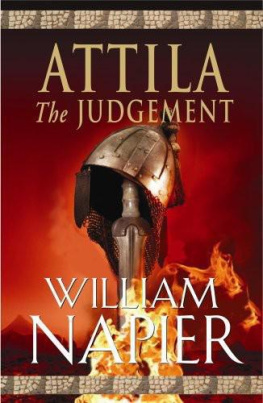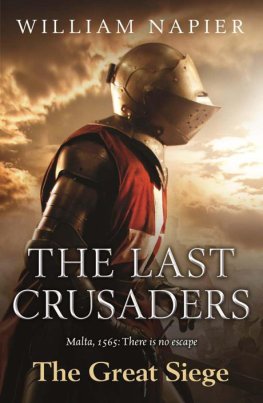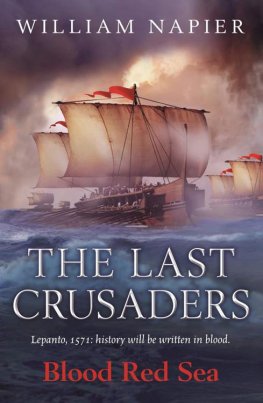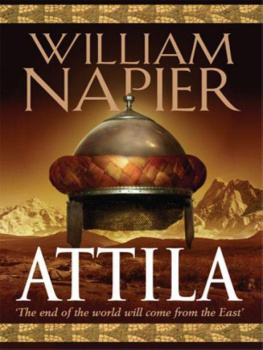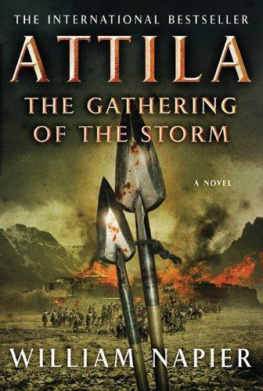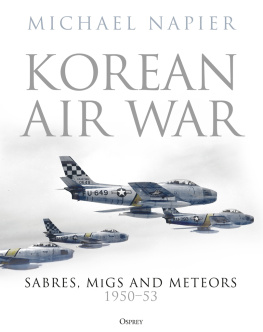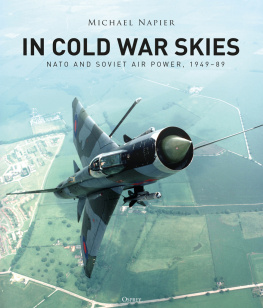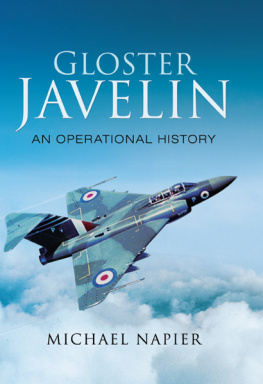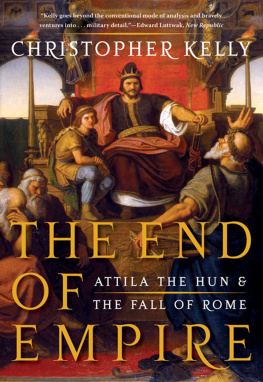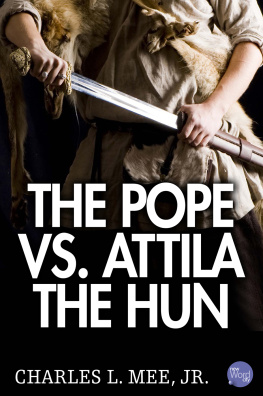William Napier - Attila: The Judgment
Here you can read online William Napier - Attila: The Judgment full text of the book (entire story) in english for free. Download pdf and epub, get meaning, cover and reviews about this ebook. year: 2008, publisher: Orion Books, genre: Adventure. Description of the work, (preface) as well as reviews are available. Best literature library LitArk.com created for fans of good reading and offers a wide selection of genres:
Romance novel
Science fiction
Adventure
Detective
Science
History
Home and family
Prose
Art
Politics
Computer
Non-fiction
Religion
Business
Children
Humor
Choose a favorite category and find really read worthwhile books. Enjoy immersion in the world of imagination, feel the emotions of the characters or learn something new for yourself, make an fascinating discovery.
- Book:Attila: The Judgment
- Author:
- Publisher:Orion Books
- Genre:
- Year:2008
- Rating:4 / 5
- Favourites:Add to favourites
- Your mark:
- 80
- 1
- 2
- 3
- 4
- 5
Attila: The Judgment: summary, description and annotation
We offer to read an annotation, description, summary or preface (depends on what the author of the book "Attila: The Judgment" wrote himself). If you haven't found the necessary information about the book — write in the comments, we will try to find it.
Attila: The Judgment — read online for free the complete book (whole text) full work
Below is the text of the book, divided by pages. System saving the place of the last page read, allows you to conveniently read the book "Attila: The Judgment" online for free, without having to search again every time where you left off. Put a bookmark, and you can go to the page where you finished reading at any time.
Font size:
Interval:
Bookmark:
THE JUDGEMENT
Attila the Hun Book Three
William Napier

Orion Books Ltd,
Orion House, 5 Upper Saint Martins Lane London, WC2H 9EA
www.orionbooks.co.uk
Table of Contents
Praise for the Attila series
[A] rip-roaring account of the boyhood of Attila the Hun, a tale jam-packed with epic set pieces, bloody battles, a fair bit of history and the requisite lusty interludes [a] gripping novel
Daily Mail
William Napier has a genius for making the blood-dimmed chaos of ancient history into the very stuff of thrilling narrative
Tom Holland, author of Rubicon and Persian Fire
He brings the fifth century back to horrible life and convincingly sets up the major players of the time for the turmoil that will have the world rocking on its axis Attilas a winner
Sunday Sport
William Napiers rattling good yarn Napier tells a great story, complete with smells and sounds, and lots of gore. The battle descriptions are particularly good I couldnt put it down
Big Issue
The final novel in the brilliant Attila trilogy is packed full of action, battles, politics and great characters. Gripping from first to last
Huddersfield Daily Examiner
William Napier is the author of three previous novels. He lives in Dorset and travels widely. Attila: the Judgement is the third novel in the Attila trilogy.
www.orionbooks.co.uk
An Orion ebook
An Orion paperback
First published in Great Britain in 2008 by Orion
This paperback published in 2008 by Orion Books Ltd,
Orion House, 5 Upper St Martins Lane,
London, WC2H 9EA
An Hachette Livre UK company
1 3 5 7 9 10 8 6 4 2
Copyright William Napier 2008
The right of William Napier to be identified as the author of this work has been asserted by him in accordance with the Copyright, Designs and Patents Act of 1988. All rights reserved. No part of this publication may be reproduced, stored in a retrieval system, or transmitted, in any form or by any means, electronic, mechanical, photocopying, recording or otherwise, without the prior permission of the copyright owner .
All the characters in this book are fictitious, and any resemblance to actual persons, living or dead, is purely coincidental.
A CIP catalogue record for this book is available from the British Library.
eISBN : 978 1 4091 1674 5
www.orionbooks.co.uk
This ebook produced by Jouve, France
LIST OF PRINCIPAL CHARACTERS
Characters marked with an asterisk were real historical figures. The rest might have been.
Atius* - Gaius Flavius Atius, born 398 in the frontier town of Silestria, in modern-day Bulgaria. The son of Gaudentius, Master-General of Cavalry, and himself later Master-General of the Roman Army in the West
Aladar - Hun warrior, son of Chanat, one of Attilas eight generals
Amalasuntha* - only daughter of King Theodoric of the Visigoths
Andronicus - captain of the Imperial Guard, Constantinople
Arapovian - Count Grigorius Khachadour Arapovian, an Armenian nobleman
Ariobarzanes - Lord of Azimuntium
Athenas* - married to the eastern Emperor Theodosius II, and re-named Eudoxia
Attila* - born 398, King of the Huns
Bela - Hun general
Cadoc - a Briton, son of Lucius
Candac - Hun general
Chanat - Hun general, father of Aladar
Checa* - first wife of Attila
Chrysaphius* - a Byzantine courtier
Csaba - Hun general
Dengizek* - eldest son of Attila
Ellak* - son of Attila
Enkhtuya - a Hun witch
Galla Placidia* - born 388, daughter of Emperor Theodosius the Great, sister of Emperor Honorius, mother of Emperor Valentinian III
Gamaliel - an aged, well-travelled medical man
Genseric* - King of the Vandals
Geukchu - Hun general
Honoria* - daughter of Galla Placidia, sister of Valentinian
Idilico - a Burgundian girl
Jormunreik - Visigothic wolf-lord
Juchi - Hun general
Knuckles - baptised Anastasius, a Rhineland legionary
Leo* - Bishop of Rome
Little Bird - a Hun shaman
Lucius - also Ciddwmtarth, a British leader of his people
Malchus - a captain of cavalry
Marcian* - eastern Emperor, 450-457, married to Pulcheria
Nemesianus - a wealthy man of Aquileia
Nicias - a Cretan alchemist
Noyan - Hun general
Odoacer* - a Gothic warlord
Orestes* - a Greek by birth, Attilas lifelong companion
Priscus of Panium* - a humble scribe
Pulcheria* - sister of Theodosius II
Romulus Augustulus* - the last emperor
Sabinus - Legionary Legate of the VII at Viminacium
Sangiban* - King of the Alans
Tarasicodissa Rousoumbladeotes* - Isaurian chieftain, also known as Zeno
Tatullus - First Centurion of the VII at Viminacium
Themistius* - an orator
Theodoric* - King of the Visigoths, 419-451
Theodoric* - Visigothic prince, eldest son of King Theodoric
Theodosius* - eastern Emperor, 408-450
Torismond* - Visigothic prince, son of King Theodoric
Valamir - Visigothic wolf-lord
Valentinian* - western Emperor, 425-455
Vigilas* - a Byzantine courtier


PART I

The Fury
Chapter 1

MARGUS FAIR
The southern banks of the Danube, AD 449
A morning in early summer. The great river meandering slowly through the rich Moesian plains and eastwards to the Euxine Sea. A patchwork of ploughland and meadow, and further away from the town, blossoming orchards and copses of ancient woodland. The smaller River Margus flowing down northwards from the hills to join the majestic Danube.
Darting over the surface of the water, the bright green metallic flash of damselflies, and columns of tiny waterflies rising and falling in the warming summer air. Willows along the banks of the river and alders beside the damp streambeds. Black poplars releasing their fluffy white seeds in clouds, landing and revolving and floating on downstream. Minnows flashing and darting in shoals, trout in among the brown boulders, beautiful grayling. Nodding kingcups reflected in the water, and the meadows all around scattered with the yellow of marsh marigold and yellow flag. No sound but the wind rustling the reeds, or the single peep of a duckling as it raced over the water back to its mother, beating its stubby little wings to no effect.
Riverine nature so peaceful and serene on this morning in early May, that for a brief moment you might think yourself back in Adams Eden, long before the Fall.
And then the shadow of a heron over the waters, cruising in silent and low, its cold and passionless yellow eyes swivelling downwards in search of prey.
Come closer to the little town of Margus with its ancient walls and its cathedral tower with its solitary iron bell, and you hear the sound of human bustle and chatter. There are naked children laughing and splashing in the shallows, brown and shiny as pebbles, mischievously opening the sallow-wood fish-traps and letting the fish swim free. There is laughter on the roads, and then in the meadows stretching up to the walls of the town itself, laid out in many colours and resounding with the languages of many different peoples - the great and celebrated Margus fair.
Font size:
Interval:
Bookmark:
Similar books «Attila: The Judgment»
Look at similar books to Attila: The Judgment. We have selected literature similar in name and meaning in the hope of providing readers with more options to find new, interesting, not yet read works.
Discussion, reviews of the book Attila: The Judgment and just readers' own opinions. Leave your comments, write what you think about the work, its meaning or the main characters. Specify what exactly you liked and what you didn't like, and why you think so.

